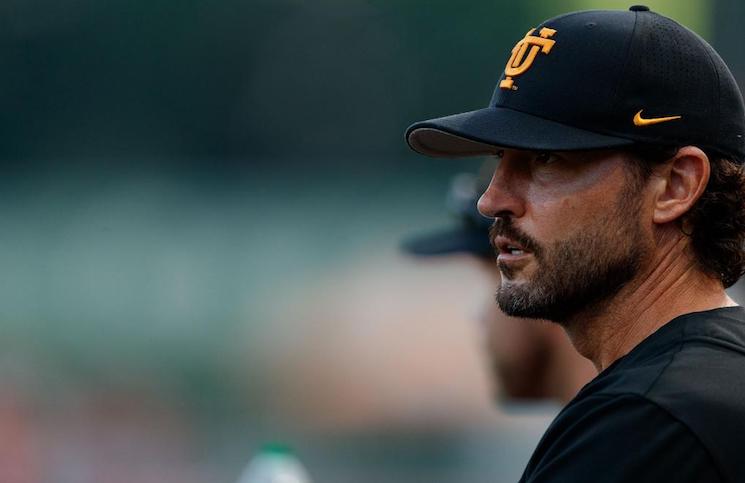There are a handful of moments that stick out when thinking back through Jalen Hurd’s impactful career at Tennessee.
The first came before it even got started.
While covering a spring practice in 2013, I noticed what seemed to be some extra buzz around the staff as it put the team through drills that day. There was an undeniable energy in the building. A few moments later I found out that it had nothing to do with that 2013 squad, but everything to do with what was to come. A big, five-star running back out of Hendersonville, Tenn., had committed to Tennessee. The 2014 recruiting class was beginning to shape up into something seemingly special, and while he was still three hours away, the Hurd era unofficially began in Knoxville that day.
I remember seeing him arrive in the spring of 2014 as well. He looked like a young Eddie George incarnate. And as the 2014 season got underway, the staff slow played him a bit, but you could still the potential. He ran for 97 yards at Oklahoma, 119 at Georgia, and you could tell that, even though the wins weren’t there yet, this would be something special.
Everybody remembers Joshua Dobbs’ performance in the come-from-behind win at South Carolina in 2014 (and rightfully so), but Hurd’s late 21-yard catch and run on fourth down might’ve been what truly saved that game. Asked about it during the postgame press conference, Jones called that a “recruiting play” – one where a superior athlete simply took over in a big moment. Again, it felt like there were many more of those to come.
Hurd then ran through South Carolina and later through Iowa that season on his way to cementing his role as UT’s lead back, and setting up a career that appeared to be bound for the record books and the NFL.
The 2015 season was the step that most expected. Aided by the addition of Alvin Kamara, the perfect complimentary back, Hurd piled up just short of 100 yards per game – finishing the 2015 season with 1,288 yards and 12 touchdowns on 277 carries. Kamara was the lightning, but it was Hurd who brought the thunder. UT had its second most prolific rushing season in school history. It wasn’t always flashy, but Hurd emerged as one of the hardest running backs in the nation.
A Georgia defender found that out the hard way on this screen pass:
This is officially what you call an exclamation mark on a catch and run by Jalen Hurd https://t.co/fo5Ps4FuDz
— Rocky Top Insider (@rockytopinsider) October 14, 2015
Like in 2014, Hurd finished 2015 strong, going for 151, 120 and 130 in his final three games. Again, the expectations couldn’t be higher heading into his next year – what many assumed would be his final in Knoxville due to his professional aspirations.
Hype grew in the offseason. Hurd posted impressive workout videos as he worked on his top-end speed (one of the few knocks against him through the first two years). The 2016 season was set to be the culmination of all that hard work and all the expectations for UT. Hurd needed just an average season to set UT’s all-time leading rushing record, and Tennessee, at the very least, was set to take the SEC East. Both seemed like foregone conclusions.
Everything was on track through four weeks – the Vols were 4-0, had finally vanquished Florida, and Hurd was still averaging around 100 yards per game and certainly running hard:
Jalen Hurd with the toughest run of his career. Vols threatening in the end zone now. pic.twitter.com/QAmzLUzkxH
— Rocky Top Insider (@rockytopinsider) September 24, 2016
Something seemed different, however, during UT’s trip to Athens on Oct. 1.
After getting down early, Hurd caught a pass and headed towards what appeared to be a certain touchdown. In the most un-Hurd-like moment of his career, he let up, jogged a step or two short of the goal line and got decked. He fumbled, Georgia recovered for a touchback and Hurd’s lapse cost the Vols a touchdown. He returned later in the game, caught a touchdown pass, but then headed to the sideline and only returned for the final kickoff return of the game. Butch Jones was vague about his status, but it kept him away from the Texas A&M game – a contest that Kamara set a new all-purpose yardage record in.
A fanbase that had always loved Hurd more and more started to favor Kamara – who was also the one named team captain (while Hurd wasn’t) – in the preseason. But with Kamara injured following the Alabama game, it was set to be Hurd’s show again in South Carolina last Saturday.
I picked him to be UT’s MVP. He was past whatever happened at Georgia, he was rested and was going to get 25+ touches. It was going to be vintage Hurd. It was anything but that.
My final – and maybe most vivid – notable memory from Hurd was seeing a close-up of his face as he prepared to take some goal-line carries in Columbia. Something didn’t look right. Maybe he was hurting, maybe he knew he was done already. I’m not sure. Even when he scored, there wasn’t a ton of energy from him or his teammates. I didn’t know at that moment that the end was coming, but something was certainly amiss.
There was really no way to prepare for what was coming Monday, however. My assumption was that anything going on wouldn’t be enough to push him away. It seemed like it would be in both sides’ best interest to push through for at least the regular season. Hurd, while maybe not rising, still very much seemed like a draftable prospect had he finished the year at UT to the best of his ability. He was two months away from getting to that point.
But clearly Hurd had other ideas.
That gets us to the awkward question about Hurd’s legacy at Tennessee. I understand the frustration from Tennessee fans that was manifested on Monday. We can dress up his departure with whatever terminology we want. At the end of the day, he quit this team and this program in the middle of a season – the first one since 2007 that the Vols have had a legitimate role in the SEC East race as well.
In my opinion, he can’t be considered an all-time great or legend at UT, regardless of what the stats say. UT legends finish the job, they don’t walk out in the middle of an SEC race and they put aside internal relationships and politics long enough to focus on the task at hand.
But I also think there should be a certain understanding for him. He’s young, he potentially has millions of dollars riding on how he handles this situation, and if being remembered as a UT great isn’t important to him, then it is his call. He doesn’t have to answer to you or me.
And while it might be tough right now, there’s also a reason for UT fans to be thankful for him. He took a chance on a coach and program that hadn’t proven anything yet. He ran hard, he didn’t publicly blame his teammates when the blocks weren’t there, and he provided UT with some great memories and more wins than the program had seen in the recent years before him.
Like the program he’s leaving right now, Hurd’s legacy goes down as somewhat of an enigma. He worked so hard to get to where he was, but now we’re not sure where he’s going. And for Tennessee fans, it’s fine to be frustrated and thankful at the same time.




